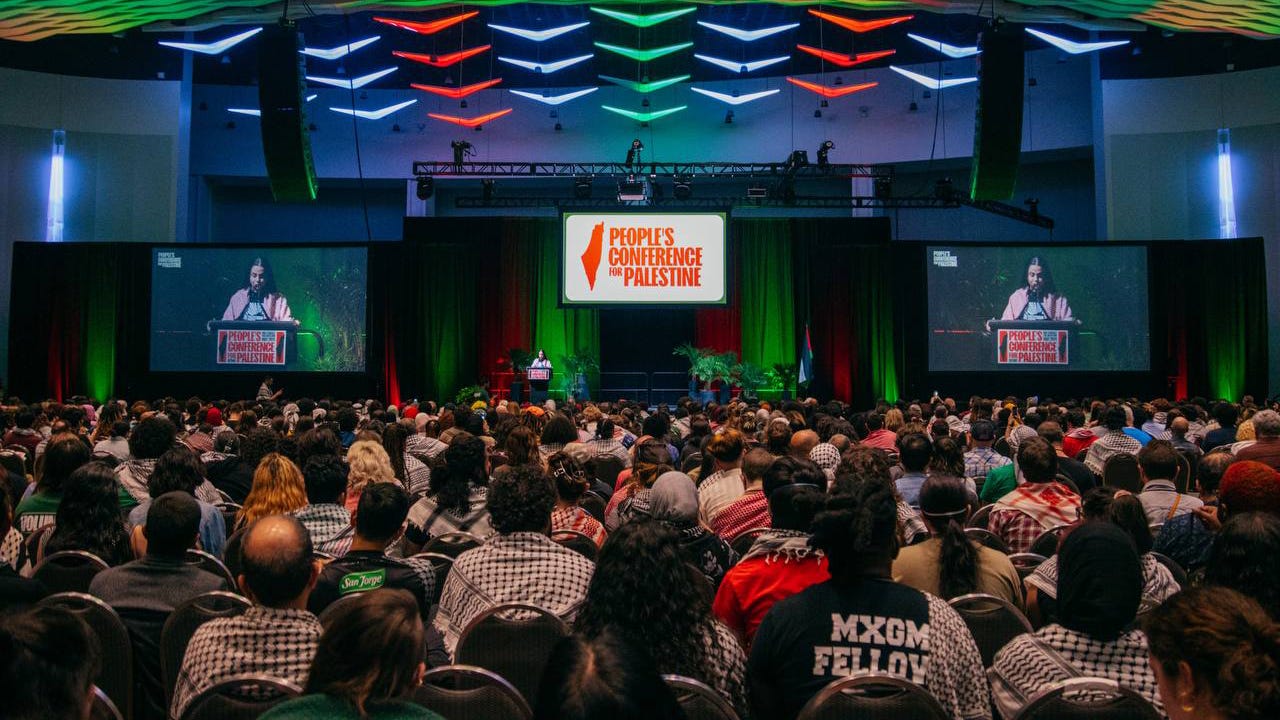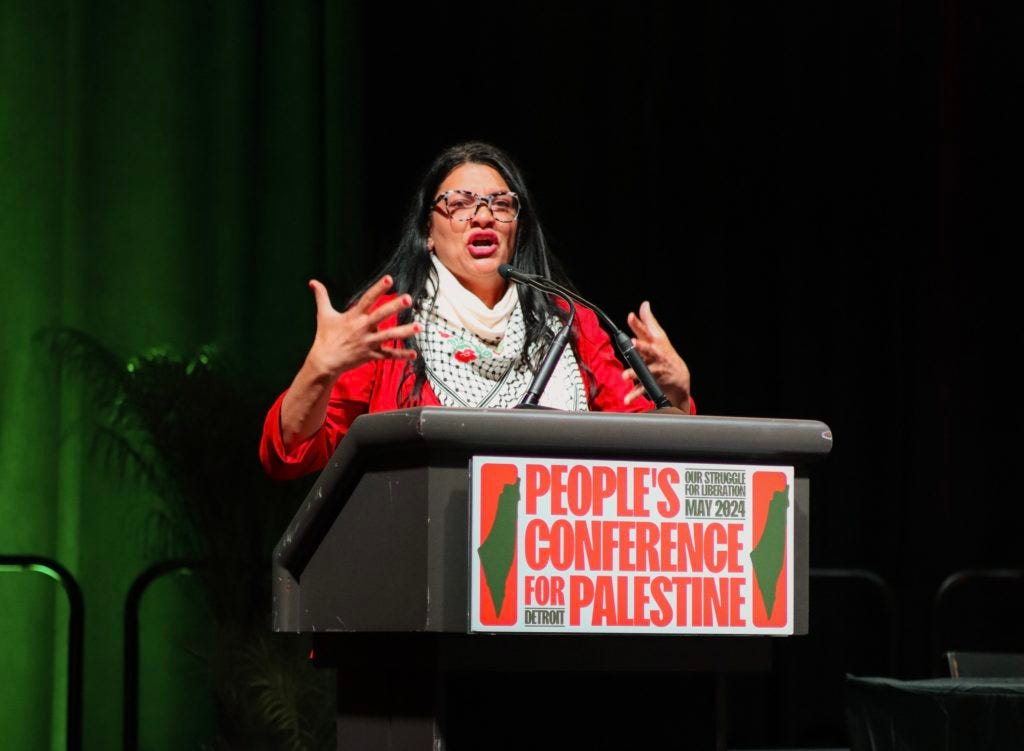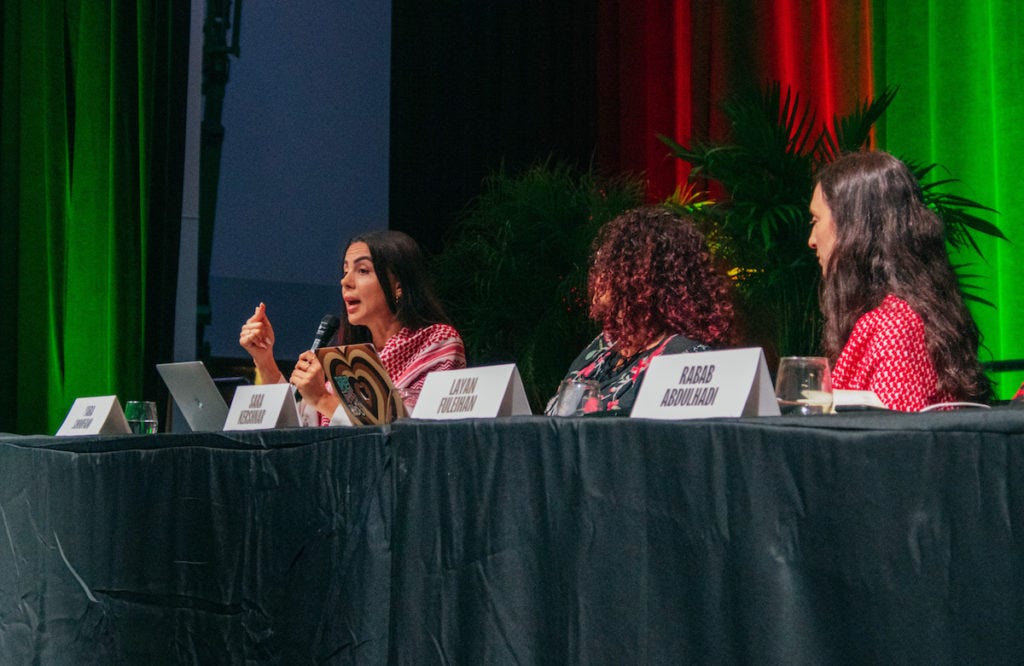Zionism Challenged
Detroit's People’s Conference for Palestine Criticises Israeli Genocide of Palestinians

On day two of the People’s Conference for Palestine in Detroit, Michigan, thousands of pro-Palestine students, teachers, workers, activists, and participants in all sectors of society met one another, and formed relationships to build the next phase in the struggle for Palestine.
The People’s Conference has been making it clear that Zionism and imperialism are being challenged across all fronts. Attendees had a surprise visit from sitting Congresswoman Rashida Tlaib, the only Palestinian in US Congress, who has been humiliated on the floor of the House of Representatives by her colleagues for the crime of supporting her people against genocide. Tlaib has been challenging Israeli genocide within the halls of power of the United States, pushing for a permanent ceasefire, despite the government she is a part of being the largest supporter of Israel globally.
In her address to conference attendees, Tlaib took on Biden’s unconditional support for Israel directly: “President Biden, I hope you hear us loud and clear. Attacking the authority of the International Criminal Court and interfering in the legal process is nothing more, nothing more than an attempt to prevent the genocidal maniac Netanyahu and his senior Israeli officials from being held accountable for those crimes against humanity.”
Tlaib also called out her colleagues in Congress who time after time vote to send billions of dollars in weapons to Israel. In April, Congress pushed through a USD 95 billion foreign aid package to further US imperialist involvement around the globe, sending billions of dollars to Ukraine, Israel, and Taiwan. This bill included USD 14 billion dollars for Israel.

“When I watch my colleagues, one by one, voting yes to send 14 billion to the apartheid regime, those committing genocide, all I kept thinking about, is that us, the United States, is the primary investor and funder of genocide. We’re literally co-conspirators,” Tlaib said.
Resistance as a solution to colonialism
The first plenary session on day two of the conference, entitled, “Palestinian Resistance and the Path to Liberation,” opened up a dialogue into the terrain of struggle that opened up the global movement for Palestine since October 7: the resistance struggle in Gaza.
During the panel, Palestinian writer and analyst Abdaljawad Omar, lecturer in the Philosophy and Cultural Studies Department at Birzeit University in the West Bank, declared that the resistance has rendered Zionism “untenable,” “deforming the current regime of colonialism that existed before October 7.”
The resistance has “designed itself around the ability and the capacity to endure, to maintain the capacity to resist, through its architectural design, such as tunnels.”
“Without the capacity to resist, and its regeneration through time, there would have been no story, hero, hope, or future to dream of,” Omar declared. Resistance, “like all political acts, fights for the future, attempts to liberate us from what Walid Daqqah, another martyr, described as the oldest Arab prisoner, the future.”
Ashraf Talhed, an organizer with the Palestinian Youth Movement in the UK, who outlined the concept of the “popular cradle,” a concept which “animates the Palestinian struggle,” in which “the masses rely on the resistance and the resistance relies on the masses…the resistance and the masses are one and the same.”
“Gaza is where the popular cradle is the strongest,” Talhed said. “And it’s precisely for this reason that Gaza is placed under siege, because its people dare to resist.”
Every time the media lies
Attendees also heard from a panel of five journalists who are waging the battle of ideas against Zionism and imperialism. Zoe Alexandra, editor of Peoples Dispatch, opened up the panel entitled “Every Time the Media Lies” (named after a popular chant “Every time the media lies / a neighborhood in Gaza dies!”).
“There are many factors which have driven millions of people across the world into the streets and into the struggle. But the real time live coverage of the genocide has shaken people to their core,” Alexandra said. “In fact, Israel is so terrified about the truth coming out, that it has assassinated 144 journalists in Gaza, and has barred media and journalists from even entering.”
Also within that same panel, journalist Yumna Patel of Mondoweiss spoke about the challenges of having mainstream media outlets publish the stories of Palestinians that defied the narrative of “victimhood.” Patel described how she waged a struggle against this narrative, as she viewed it as inconsistent with reality.
“In my experience, all the people that I would speak to, no matter is it was the family of a prisoner on hunger strike or again, someone whose home was just demolished, no one I ever spoke to, despite the situation that they were in, despite the incredible oppression that they were facing, they would never just refer to themselves or portray themselves as a victim,” Patel described. “When people spoke about resilience, there’s a reason that they were able to be resilient. And it was through resistance.”
Patel described an anecdote about reporting on a young Palestinian boy who was killed in so-called “clashes,” as mainstream media would call Israeli aggression, and the importance of mentioning the fact that the boy was throwing stones when he was killed, “one of the only methods of resistance that he could cling onto.”
Challenging Zionism in the workplace
The global mass movement for Palestine since October 7 has seen a historic political shift in one of the most pivotal sectors of society in the United States, organized labor. For the first time in the history of the country, workers are on strike in relation to Palestine solidarity. United Auto Workers Local 4811, which represents student workers across the University of California system, began their “stand up” strike at several UC campuses following the brutal police and university repression of pro-Palestine student encampments.
Peoples Dispatch spoke to Rafael Jaime, President of UAW Local 4811, attending the conference alongside several other UAW 4811 members. Recently, the latest attempt by university administrators to stop the strike was thwarted, after a UC injunction claiming the strike was illegal was denied by a California state labor board.
Palestine “is one of the defining issues of our generation,” Jaime told Peoples Dispatch. UC workers are walking off the job because “all of this really is tied up with our own working conditions. If we can’t protest over something so important, such as the ongoing war on Gaza, then it really is an attack on our own, really our fundamental right to protest over anything, to take action over our rights as workers.”
“Our union was one of the first locals to issue a statement in support of a cease fire,” Jaime described. UAW 4811 workers were instrumental to making the larger UAW International “the first major American union to come out in support of a ceasefire,” Jaime said.
A gateway to struggle
The day concluded with a plenary session entitled “Zionism and US Imperialism,” in which panelists analyzed the so-called “special relationship” between Israel and its biggest supporter, the United States. Yara Shoufani, a leader in the Palestinian Youth Movement in Toronto, Canada, gave a detailed analysis on how the US been a key architect in key elements of the oppression of Palestinians, including the formation of the Palestinian Authority as an enforcing arm of the occupation, and the ongoing blockade against Gaza by air, land, and sea. US imperialism also continues to suppress popular movements at home, even by denying visas of speakers at the conference itself.

“We know that US empire is trying to actively intervene against our organizations, against our movements. And this attempt to crush Palestinian revolution here actually should tell us just how powerful we are, and just how much we scare them, because the Palestinian revolution is a gateway to struggle,” Shoufani articulated.



